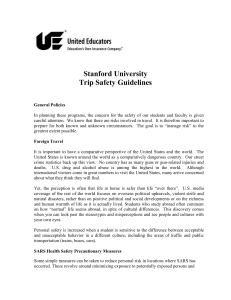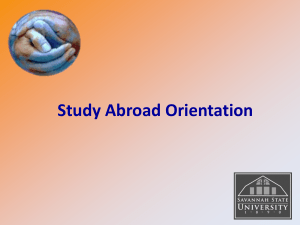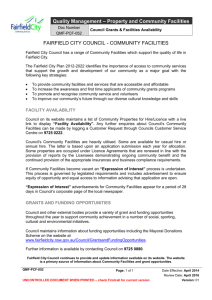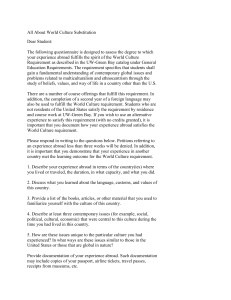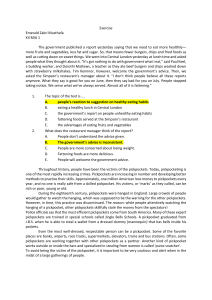Study Abroad Travel - Fairfield University
advertisement
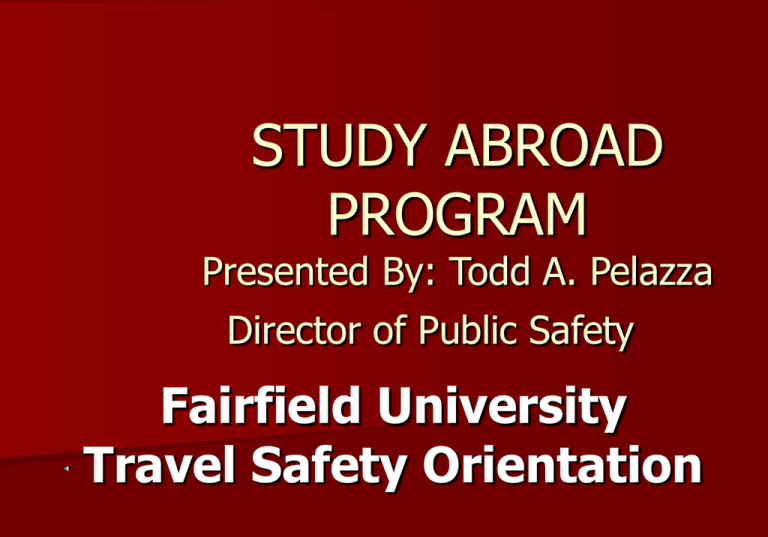
STUDY ABROAD PROGRAM Presented By: Todd A. Pelazza Director of Public Safety Fairfield University Travel Safety Orientation STUDY ABROAD TRAVEL SAFETY ORIENTATION Developed By: Todd A. Pelazza, Director of Public Safety Fairfield University Department of Public Safety Special Thanks & Acknowledgement Paul A. Anderson, Director of Campus Safety at St. Norbert’s College (WI) Paul F. Glowacki, Chief of Police, St. Mary’s University Dennis Gladwell, Police Officer with the De Pere, WI PD Wake Forest University Police Department in North Carolina Federal Bureau of Investigation US Department of Homeland Security US Department of State Overseas Security Advisory Council (OSAC) Center for Global Education at Loyola Marymount University Safety Abroad First – Educational Travel Information (SAFETI) To be covered and discussed: Preparing to go. What to bring. Safety where you reside. Safety in the area. Safety on the street. Threat Assessment. Kidnapping. Local laws. Preparing for Terrorism. BEFORE YOU GO Preparation is the key to your safety!! Prepare your resources – Copies of travel itinerary, phone numbers (emergency and otherwise), agenda, flight numbers, travel agency, back-up plans, etc. NOTE: Planning ahead is a critical factor in successfully dealing with a crisis. Booking Hotels. As much as possible, plan to stay in larger hotels that have more elaborate security. Safety experts recommend booking or residing in a room from the second to seventh floors above ground level to deter easy entrance from outside, but low enough for fire equipment to reach. Before you go- Credit Cards Make a note of the credit limit on each credit card that you bring. Record and take with you the toll free phone numbers for each of your credit cards. In some countries, Americans have been arrested for innocently exceeding their credit limit. Before you go- Insurance Find out if your personal property insurance covers you for loss or theft abroad. Check if your health insurance covers you abroad. If your program does not provide health Ins., consider purchasing HTH Ins. Departing and Arriving Get permission for any unusual electronic equipment. Do not take any weapons (firearms, any type of edged weapons, Pepper spray, etc). Travel in a GROUP, whenever possible! If at all possible, have someone meet you at the airport. Departing and Arriving - Luggage Put your name, address and telephone numbers inside and outside of each piece of luggage. Do not identify your luggage with tags, student tags, stickers, etc. Use luggage tags to avoid casual observation of your identity. If possible, lock your luggage after TSA inspection. Clothes Safety begins when you pack. Take only what you need. To avoid being a target, dress conservatively. Adjust to local customs & dress. A flashy wardrobe or one that is too casual can mark you as a tourist or foreign student. Keep back packs and book bags in hand at all times. Money Don’t carry large amounts of cash, but have reserve cash on your person, just in case. Use travelers checks or credit cards whenever possible. Record (encrypt?) serial numbers of travelers checks & credit card account info. Store this info safely – online? Medications Make sure you have enough prescription medication to last your entire trip. Keep in their original labeled containers to avoid problems when passing through customs. Tickets and Telephone cards Keep careful tabs on your plane, train, or bus tickets, they are as valuable as cash. Have a CELL PHONE and consider getting a telephone card, in case your cell phone does not function suddenly. It is a convenient way of keeping in touch. In your room, hotel or motel Keep your door locked at all times. Guard your key/keycard. Use auxiliary locking devices. Do not answer the door without knowing who is there. If a person claims to be an employee, call the front desk and verify. While There Check your belongings daily. Arrange your possessions so you will know immediately if something is missing. Consider storing valuables in a safe. Some hotels and rooms have room safes. Keep up-to-date on Threats and Warnings issued by the U.S. Department of State at http://www.travel.state.gov State Department Travel Advisories While There (Continued) Do not hitchhike. Learn the location of the closest hospital, police station and friendly embassy. Carry only what you need. Stay away from protest groups or any other political demonstrations. If there is a crisis in the country, such as a bombing, etc., contact your faculty advisor for guidance and family to let them know that you are “OKAY” and what you are planning to do. Elevators and Parking If you are alone, do not get on an elevator if there is a suspiciouslooking person inside. If such a person enters while you’re alone in the elevator, get out on that same floor. Look around before entering parking lot or garages. Park near lighted walkways when possible. Safety on the Street Carry your purse close to your body- don’t let it dangle. Carry your wallet in an inside coat or front trouser pocket. Carry only the cash and/or credit cards, ID’s, etc. that you need. Don’t flash your cash or jewelry. Use a credential pouch or belly money belt. Your surroundings Learn about and be aware of your surroundings (360 Degree Awareness). Make sure everyone in your party knows the name and telephone number of the place that you are residing. A word on ID’s (keep in your possession) and Fake ID’s (Remove any fake identification in your possession). Safety on the street Select sightseeing companies, guides and drivers carefully. Avoid scam artists and gypsies. Be wary of strangers who approach… and offer you bargains that seem ‘too good to be true,’ or offer huge discounts or deals on tourist attractions tickets, offers to be a ‘tour guide’ or such. Safety on the street - Threat Assessment Don’t use short cuts, narrow alleys or poorly-lit streets. PLAN your movements, in advance. Make sure others know about your whereabouts (faculty advisors, other students, etc.) Try not to travel alone at night. Try to seem in control and assertive when you move about. Even if you are lost, act as if you know where you are going. EXPECT the Unexpected and TRUST your Instincts! Watch, Report and Protect Yourself Past Problems Medical Problems/prescriptive medications Petty Theft, Theft of passport or personal documents, Pickpockets, scam artists, etc. Sleeping on train or bus and having valuables stolen. Robbery with the intent to use your credit card for illegal purchases. Using unlicensed Taxi Cabs – Make sure the Taxi is licensed with a telephone # Pickpockets and thieves Beware of thieves like gypsies, i.e., palm readers, etc.) Beware of pickpockets. They often have an accomplice who will – Jostle you – Ask you for directions or the time. – Distract you by creating a disturbance. Pickpockets and thieves If you are confronted, don’t fight back. Give up your valuables. Your money, passport and property can be replaced but you cannot. Minimize the opportunity for this and reduce its impact by not wearing lots of jewelry or carrying unnecessary items. Pickpockets and thieves If your possessions are lost or stolen, report the loss immediately to the local police. Keep a copy of the police report for insurance claims. Did You Know………. Few U.S. Citizens realize that Mexico became the world’s second most dangerous country for kidnapping when it passed Brazil in 1995. About 1,500 kidnaps are estimated annually (Brazil and Guatemala numbers 3 and 4). Source: http://www.g21.net/narco.html Kidnapping on a Global Perspective Global estimates range from 10,000 to 15,000 kidnaps per year. More than 80% of the world’s kidnapping events are in Latin America, where almost all are for ransom. Columbia is, undisputedly, the world kidnapping capital (Source: Reuters – 01/08/1998). In the Event of a Kidnapping…… Before leaving agree upon proof of life questions, i.e., information that only you and your family would know about you, such as, the name of your dog, school attended, maiden name of grandmother, first boyfriend/girlfriend, etc. Local Laws When you leave the United States, you are subject to the laws of the country where you are. Therefore, before you go, learn as much as you can about the local laws and customs of the places you plan to visit. Be cautious when taking pictures. When in doubt, ASK FIRST! Your Behavior and Conduct “Your not in Kansas anymore!” Alcohol and Controlled Substance Abuse can lead to legal problems and/or jail time. Criminal Conduct will lead to real problems in your life that the U.S. will not be able to resolve for you. Think before you act. Your freedom depends on it. Preparing for Terrorism Wherever you are, be aware of your surroundings. The very nature of terrorism suggests there may be little or no warning. Take precautions when traveling. Be aware of conspicuous or unusual behavior. Do not accept packages from strangers. Do not leave luggage unattended. Unusual behavior, suspicious packages and strange devices should be promptly reported to the police or security personnel. Preparing for Terrorism (Cont.) Do not be afraid to move or leave if you feel uncomfortable or if something does not seem right. Learn where emergency exits are located in buildings you frequent. Notice where exits are when you enter unfamiliar buildings. Plan how to get out of a building, subway or congested public area or traffic. Note where staircases are located. Notice heavy or breakable objects that could move, fall or break in an explosion. In Trouble or Need Help Contact the Site Director, Immediately! Contact Study Abroad Programs official at Fairfield University. Contact Nearest American Embassy or Consulate. Contact Oversees Citizens Services (317) 472-2328 or (888) 407-4747. Contact Fairfield University, Department of Public Safety at (203) 254-4090 (open 24/7) and provide your information and call back number(s). Internet sites on travel Internet sites on travel information in other countries from the government are: – – – – – – http://www.pueblo.gsa.gov (click on travel) http://www.state.gov http://www.studentsabroad.com http://www.state.gov/travel/ http://travel.state.gov/acs.html#emr http://www.travel.state.gov/links.html (For The Nearest U.S. Embassy/Consulate) U.S. Citizen On-Line Travel Registration U.S. citizens around the world who travel or reside abroad can access this site either through a link on travel.state.gov, or directly, at https://travelregistration.state.gov/ibrs We invite you to register yourself and your family and get acquainted with travel registration. If you are already registered with an embassy, please re-register on line to update your records. Have a Safe Trip & Remember Good Planning Reduces RISK! Call if you need us. Remember, The Department of Public Safety is always open to handle emergencies and we are available to serve your needs, on campus and when you are traveling & studying abroad. QUESTIONS, CONCERNS, ETC. Contact Information Todd A. Pelazza Director of Public Safety Fairfield University Office (203)254-4090 Fax (203)254-4238 tapelazza@mail.fairfield. edu
